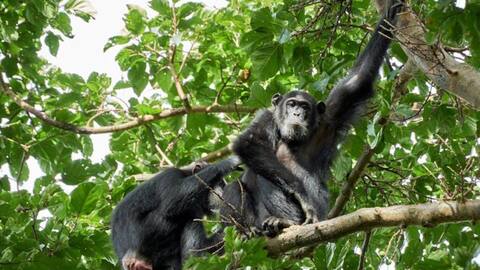Chimpanzees self-medicate; use more plant medicines than anyone
A multinational research team, composed of researchers from the University of Oxford and various institutions in Europe, Japan, and Uganda team has discovered that chimpanzees use more plant medicines than any other animal. The findings, published in PLOS ONE, suggest adding 17 samples from 13 plant species to the chimpanzee pharmacopeia. A cognitive biologist at the Max Planck Institute of Animal Behavior, Isabelle Laumer, states this discovery is significant in understanding self-medication behavior in wild chimpanzees.
Research observes chimps' self-medication in Uganda
The research team spent four months observing two chimpanzee communities in Uganda's Budongo Forest. From the 170 chimps in the two communities, the observers tracked 51 chimps suffering from bacterial infections and inflammation, identified by abnormal urine composition, diarrhea, parasite traces, or visible wounds. The researchers followed these sick chimps for 10 hours a day, noting which plants they consumed and when.
Chimps's unusual behavior leads to medicinal plant discovery
In one observation, a chimp with diarrhea was seen eating a small amount of dead wood from Alstonia boonei, a tree in the dogbane family. This behavior is unusual as chimps rarely consume dead wood due to its lack of nutrition. Another chimp with a hand wound was observed consuming leaves of Christella parasitica, a type of fern.
Plants consumed by chimps exhibit medicinal properties
The research team tested all the plants consumed by the sick chimps for antibiotic and anti-inflammatory properties. They found that Alstonia boonei showed antibacterial and anti-inflammatory activity in vitro, and is used by traditional medicine practitioners in Africa to address bacterial infections, gastrointestinal problems, snakebites, and asthma. The fern Christella parasitica also demonstrated anti-inflammatory properties which could have aided the chimp's hand injury.
Chimps's plant choices align with local traditional remedies
Out of the 13 plants investigated, 11 are used in local traditional remedies, reinforcing the theory that chimps use plants for healing purposes. According to Oxford primatologist Elodie Freymann, the study's lead author, the self-medication seemed effective for all 51 sick chimps, with each individual recovering relatively quickly. However, she notes that it's uncertain whether the plants directly contributed to their healing.
Questions remain on chimps' deliberate selection of medicinal plants
There are still questions about how deliberately chimps choose these supposedly medicinal plants. Harvard University primatologist Richard Wrangham wants to investigate whether plants the chimps ignore lack medicinal compounds. Michael Huffman, a primatologist at Nagasaki University and co-author of the study, acknowledges that the new plant candidates need more detailed investigation. However, he points out that current evidence suggests the sick chimps select plants that could alleviate their symptoms.

